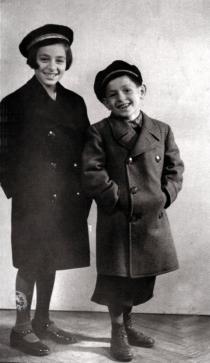This is a rarity, I don't think that many people have something similar. The government ordered a municipal census in 1942 because they wanted to know exactly how many Jews lived in Romania. The Romanian Jewish Center had a branch office in all the bigger towns and it was ruled that all Jews had to register there. Even those who only had one Jewish grandparent had to register. Everybody had to fill in a form in the office of the Jewish community. I was a child then, I was under 18, so it was my father who had to register me. His identity number is written here on the left and on the receipt it also says that the parents received the certificate and next to it is my father's signature.
We didn't really know anything about what was going on until 1944, when deportations started in Hungary. There were rumors about what had happened to Polish Jews, we heard that they had been forced into camps, but we had never heard about people being burnt in Auschwitz. We knew about the events [deportations] in Hungary because there were hardly any Jews in Transylvania, who didn't have relatives in Northern Transylvania or in Hungary. Some families in Brasso decided that if it came to ghettoization, they would refuse to be taken into the ghetto, even if it was a family of four, but they would rather flee in four directions so that at least one of them would survive. My parents were of the same opinion. Today we see it as a generous gesture on behalf of the Romanian state [that the Jews of Romania weren't handed over to the Germans], but it wasn't really a question of generosity, rather of profiting from the situation.
During the war the Saxon youth, rather than the Saxon population in general, were very provocative versus the Jews. It happened many times that they would shout 'Jude, Jude' at you on the street and spit you in the eyes without you having done anything. At the beginning, before the legionaries confiscated Jewish stores, they put up signs saying that Christians shouldn't do their shopping there because these were Jewish stores. In 1943 a sign printed on yellow paper appeared in Saxon bars, restaurants and pastry shops, which said 'Eintritt fuer Juden ist unerwuenscht', which means that the entry of Jews was undesirable. These posters were still up in these places even in 1944. People didn't dare to take them off; the pressure on them was too big. I'm sure that this was done by the Volksgruppe - this was the name of the Germans' organization in South Transylvania.
Vasile Grunea's certificate of Jewish origin
The Centropa Collection at USHMM
The Centropa archive has been acquired by the United States Holocaust Memorial Museum in Washington, DC.
USHMM will soon offer a Special Collections page for Centropa.
Academics please note: USHMM can provide you with original language word-for-word transcripts and high resolution photographs. All publications should be credited: "From the Centropa Collection at the United States Memorial Museum in Washington, DC". Please contact collection [at] centropa.org.
























